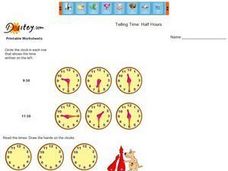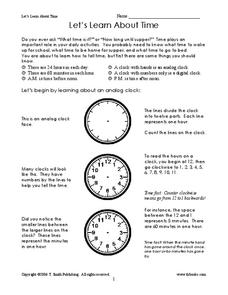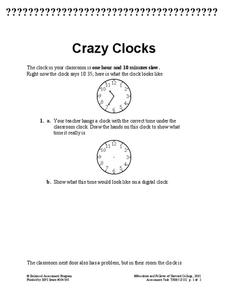Curated OER
Telling Time
Young learners participate in activities which help them understand analog clocks, and the vocabulary of telling time. They examine the values of the intervals of minutes and hours by making a human clock.
Curated OER
Telling Time to the Hour
In this telling time worksheet, students practice their time-telling skills. Students are given six clock faces and a time for each clock. Students are to draw the hands on the clock face representing the time provided.
Curated OER
Telling Time to the Hour
In this telling time learning exercise, students draw the hour hand and the minute hand to illustrate the given digital times in the 6 examples.
Curated OER
Kids Learn Time Worksheet - One Minute Intervals, Version 2
Students practice telling time to the minute with this attractive and easy to understand worksheet. By drawing the hands on a clock, students practice their time-telling skills.
Curated OER
Time Worksheet - 1 Minute Intervals
For this telling time worksheet, students look at 9 clocks and record the exact time on each one on the line right underneath each clock.
The Digits
Telling Time: The Digits
Time to teach your students how to read a clock? This resource is here to help! Engaging young mathematicians with two fun videos and a series of hands-on activities, these lessons offer a multimedia approach to teaching this important...
Curated OER
Telling Time With Clocks/Bingo “Time”
Young learners create a clock by adding hands and placing the numbers in the correct location. After each learner has their very own clock, they explore each component. Review on the hour times, and then introduce them to five-minute...
Curated OER
Telling Time to the Hour and Half Hour
Young scholars solve six problems in which they write the time (to the hour) that each clock shows. Then, everyone matches six clocks with the correct times by drawing a line to match. A good, solid worksheet.
Curated OER
Telling Time: Half Hours
Young mathematicians circle the clock in each of two rows that shows the time that is written. Everyone draws the hands on four clocks to display the times (to the half hour) shown. A good, basic worksheet.
Curated OER
Half Past Times
Learning how to tell time on an analog clock can be tricky for some kids. Start with the basics and teach them to determine the half-past time. There are five clocks shown. Learners draw in the times indicated, each time is half-past the...
Curated OER
Analog Clock Faces: Drawing Hands on Analog Clocks Telling Digital Time in 5 Minute Intervals
For this telling time worksheet, learners study 9 blank clocks with a digital time written below. Students draw the hands on the clocks to match the times that are to the nearest 5 minutes.
Curated OER
Telling Time in Words
Writing out time can be tricky! Give your scholars practice with this pair of worksheets featuring both analog and digital clocks. They read the times and write it out in the boxes provided. Make sure you specify that learners are to...
Curated OER
Telling Time: Free Version
In this telling time worksheet, students solve 9 problems in which the time on an analog clock is analyzed. Students write the time in numbers under each clock. All times are to the nearest 5 minutes.
Curated OER
What Time is it?
Here is a nice presentation on time; how to read analog clocks and calculating elapsed time. The graphics, and problems posed in this PowerPoint are especially good. One nice feature is that students are encouraged to work together in...
Curated OER
Telling Time: Two Ways to Read the Time
Second graders discuss the two different ways of reading time. They study the vocabulary "minutes to" and tell time in five minute intervals. They discuss why it is important to have schedules and students list some schedules that they...
Curated OER
Draw Hands On the Clock to Show The Time (Analog Clock - St. Patrick's Day)
In this telling time worksheet, students draw the hands on 6 analog clock faces to show time to the half hour. They see a St. Patrick's day decoration on each clock face.
Curated OER
Read the Time: Quarter Hour and Half Hour
In this telling time learning exercise, students draw lines to match each analog clock face to the digital clock that says the same time. All times are to the nearest half or quarter hour.
Curated OER
Let's Learn About Time
Learning to read an analog clock is not a lost art! Use these worksheets as you introduce youngsters to telling time. Because much of this packet is informational and includes a lot of text, this may be intended for older students....
Curated OER
Extra Practice with Time: Using menos
How do you tell time in Spanish? Provide each learner with this reference guide and practice sheet to introduce telling time in another language. Begin by reading through the first two informational pages that describe how time is...
Curated OER
What Time Is It? Part 2
Tell time to the half hour with these analog clocks! The first six problems invite first graders to write the correct times below, while the second set of problems provide the time and empty clock faces. A great way to review your time...
Curated OER
Digital Clocks
Don't skip over digital clocks when teaching youngsters how to tell time; here are 10 opportunities for them to practice with half-hour increments. For the first five, they write the time below each clock. The format is word form (half...
Concord Consortium
Crazy Clocks
While a stopped clock is right twice a day, a fast or slow clock confuses people for weeks. Scholars observe a clock running slow and must correct it before observing a clock running fast and working it backward. Finally, a multi-step...
Curated OER
Morning Math
Here is a series of morning math activities which will get your class thinking as they start the day. Simply do one or two every day; the variation in types of math will keep them on their toes and reviewing past concepts. Each of the 16...
Curated OER
Tick Around the Clock
Young scholars examine and discuss the differences between clocks they are shown. Using the internet, they research how people used to tell time before clocks. They review what the long and short hand on the clock represent and practice...

























